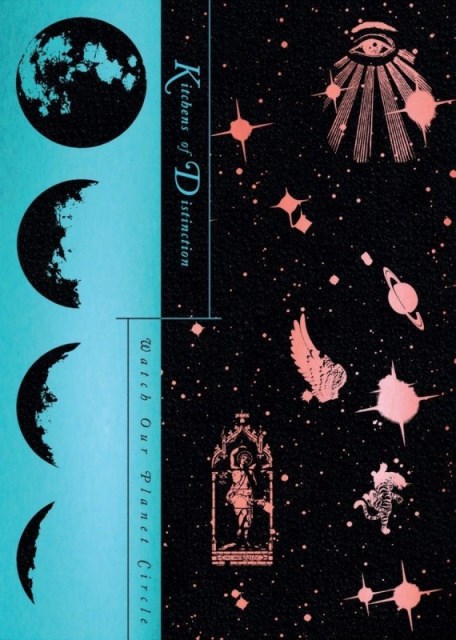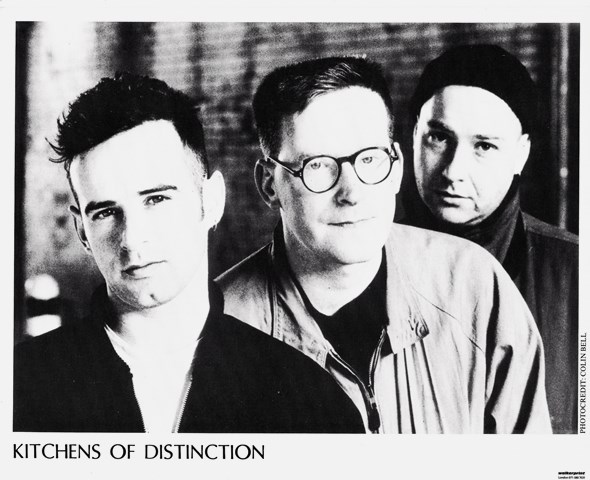Reissue CDs Weekly: Kitchens of Distinction | reviews, news & interviews
Reissue CDs Weekly: Kitchens of Distinction
Reissue CDs Weekly: Kitchens of Distinction
The rise and fall of an often-fabulous band charted on comprehensive box set

Albums are not meant to be heard this way. Collecting a band's output in one package inevitably obscures that what’s being heard might have been recorded and released over years. The listening time may be five or six hours, but eighteen months could have separated albums when they were originally released. Messing with time messes with reality.
For Kitchens of Distinction, the new, six-disc box set Watch Our Planet Circle includes their four albums for the One Little Indian label across each of discs one to four. Disc five rounds up B-sides and other non-album material (a contemporaneous EP is tacked on to disc one), while disc six compiles eight tracks taped for BBC radio. A six-year period is covered.
 The other issue with a comprehensive album-driven box set is that it can chart a rise and fall. Debut albums typically catch bands arriving fully formed but winningly rough-edged. This is the sound and style which gained them a live following and interested the label that signed them. Albums two and three might bring in a new producer to consolidate and refine what had (hopefully) become successful. Then, by album four, it's reiteration as the artistic playing field had been levelled. Surprises rarely surface at or after this point though there could be painful flirtations with then-voguish window dressing to freshen the sound – maybe some ill-fitting Balearic touches, or perhaps treated vocals (hello, Bon Iver) – but that rarely moves the band on. Instead, they appear desperate. A well-considered best-of sidesteps all these thorny issues.
The other issue with a comprehensive album-driven box set is that it can chart a rise and fall. Debut albums typically catch bands arriving fully formed but winningly rough-edged. This is the sound and style which gained them a live following and interested the label that signed them. Albums two and three might bring in a new producer to consolidate and refine what had (hopefully) become successful. Then, by album four, it's reiteration as the artistic playing field had been levelled. Surprises rarely surface at or after this point though there could be painful flirtations with then-voguish window dressing to freshen the sound – maybe some ill-fitting Balearic touches, or perhaps treated vocals (hello, Bon Iver) – but that rarely moves the band on. Instead, they appear desperate. A well-considered best-of sidesteps all these thorny issues.
With the often-fabulous Kitchens of Distinction and their Watch Our Planet Circle, both issues are never far. The period covered is 1988 to 1994, when they were signed to One Little Indian. Their self-issued 1987 single is not included: nor is their final one from 1996. Their reunion which followed their 1996 split is also not covered. Over those core six years, the band moved from British toilet venues to theatres and, then, to touring America, where they were cherished on what was called the college circuit.
Their music was, as the smart essay from author and journalist Martin Aston makes clear, initially inspired by Cocteau Twins, R.E.M and The Smiths. It resulted in an instantly recognisable (early) goth-tinged, non-vaporous shoegazing with an anthemic edge. They wrote and played songs, not atmospheres. Live, they could be extremely powerful. They also, in Patrick Fitzgerald, had a charismatic, voluble, openly gay singer/bassist.
 April 1989’s Life is Hell was Kitchens of Distinction’s self-produced debut album. Its cover art incorporated four naked men. On it, the band’s approach is already honed. Nothing is tentative and the songs are strong. A guitar shimmer coats everything. It ends with the intense “Hammer”. But it sounds thin.
April 1989’s Life is Hell was Kitchens of Distinction’s self-produced debut album. Its cover art incorporated four naked men. On it, the band’s approach is already honed. Nothing is tentative and the songs are strong. A guitar shimmer coats everything. It ends with the intense “Hammer”. But it sounds thin.
Strange Free World (March 1991) was the follow-up. This time (and also with August 1992’s third album The Death of Cool) their producer was Hugh Jones, who had worked with Echo & The Bunnymen so understood dynamics and texture. He brought out his new client’s latent power, helped fill out the sound and encouraged them – especially guitarist Julian Swales - to experiment with sonic layering. Overall, the songs on Strange Free World and The Death of Cool have more reflective melodies than the debut album and are less immediate, but both are fine albums.
Their fourth, October 1994’s Cowboys and Aliens, is problematic. The band co-produced it with Pete Bartlett who, in 1996, steered Lush into their clumping and ill-advised dalliance with Britpop. His crude work here appears to be the dry run for unsuccessfully recasting a band. In 1994, with Kitchens of Distinction, he rendered their sound huge, foregrounded Fitzgerald’s vocals and recorded drummer Dan Goodwin whacking out wince-inducing, shuffling, baggy rhythms. There are also programmed beats. Kitchens of Distinction’s previous core ethos was sublimated on an album about gesture and then-current tropes. Cowboys and Aliens still sounds like them, but it is not a comfortable listen. On disc six, a radio session from this period catches four of the album’s songs without the needless embellishment or grandiosity.
Kitchens of Distinction were frequently outstanding and the casebound Watch Our Planet Circle is a suitably well-designed tribute. But in presenting what they recorded without a filter it, unsurprisingly, has its low points. Nonetheless, it should be acquired. Move fast, there only 1000 copies.
Share this article
The future of Arts Journalism
You can stop theartsdesk.com closing!
We urgently need financing to survive. Our fundraising drive has thus far raised £49,000 but we need to reach £100,000 or we will be forced to close. Please contribute here: https://gofund.me/c3f6033d
And if you can forward this information to anyone who might assist, we’d be grateful.

Subscribe to theartsdesk.com
Thank you for continuing to read our work on theartsdesk.com. For unlimited access to every article in its entirety, including our archive of more than 15,000 pieces, we're asking for £5 per month or £40 per year. We feel it's a very good deal, and hope you do too.
To take a subscription now simply click here.
And if you're looking for that extra gift for a friend or family member, why not treat them to a theartsdesk.com gift subscription?
more New music
 Album: David Byrne - Who is the Sky?
David Byrne - born to be weird
Album: David Byrne - Who is the Sky?
David Byrne - born to be weird
 Edinburgh Psych Fest 2025 review - eclectic and experimental
Underground gems and established acts in this multi-genre, multi-venue day long festival
Edinburgh Psych Fest 2025 review - eclectic and experimental
Underground gems and established acts in this multi-genre, multi-venue day long festival
 Album: Faithless - Champion Sound
Three decades into their career the perennial dance duo nail a lengthy but likeable set
Album: Faithless - Champion Sound
Three decades into their career the perennial dance duo nail a lengthy but likeable set
 Album: Saint Etienne - International
British pop institution’s final communiqué is an unalloyed winner
Album: Saint Etienne - International
British pop institution’s final communiqué is an unalloyed winner
 Album: Brad Mehldau - Ride into the Sun
A sincere tribute to Elliott Smith
Album: Brad Mehldau - Ride into the Sun
A sincere tribute to Elliott Smith
 Music Reissues Weekly: The Outer Limits - Just One More Chance
Exhaustive anthology unearths the full story of the Sixties mod-pop band from Leeds
Music Reissues Weekly: The Outer Limits - Just One More Chance
Exhaustive anthology unearths the full story of the Sixties mod-pop band from Leeds
 theartsdesk Radio Show 37 - Pete Lawrence of the Big Chill discusses the power of protest music and his new project This Is The Fire
Talking to cultural activist Pete Lawrence – camp outs, singalongs and saving the world
theartsdesk Radio Show 37 - Pete Lawrence of the Big Chill discusses the power of protest music and his new project This Is The Fire
Talking to cultural activist Pete Lawrence – camp outs, singalongs and saving the world
 Album: Sabrina Carpenter - Man's Best Friend
Short but not so sweet
Album: Sabrina Carpenter - Man's Best Friend
Short but not so sweet
 Album: CMAT - EURO-COUNTRY
The flame-headed chanteuse with the comic touch hits pop perfection
Album: CMAT - EURO-COUNTRY
The flame-headed chanteuse with the comic touch hits pop perfection
 Album: The Hives - The Hives Forever, Forever The Hives
No power ballads, no acoustic interludes - just speedy rock’n’roll all the way
Album: The Hives - The Hives Forever, Forever The Hives
No power ballads, no acoustic interludes - just speedy rock’n’roll all the way
 Album: Benedicte Maurseth - Mirra
Haunting, intense evocation of Norway’s uplands and its wildlife
Album: Benedicte Maurseth - Mirra
Haunting, intense evocation of Norway’s uplands and its wildlife

Add comment